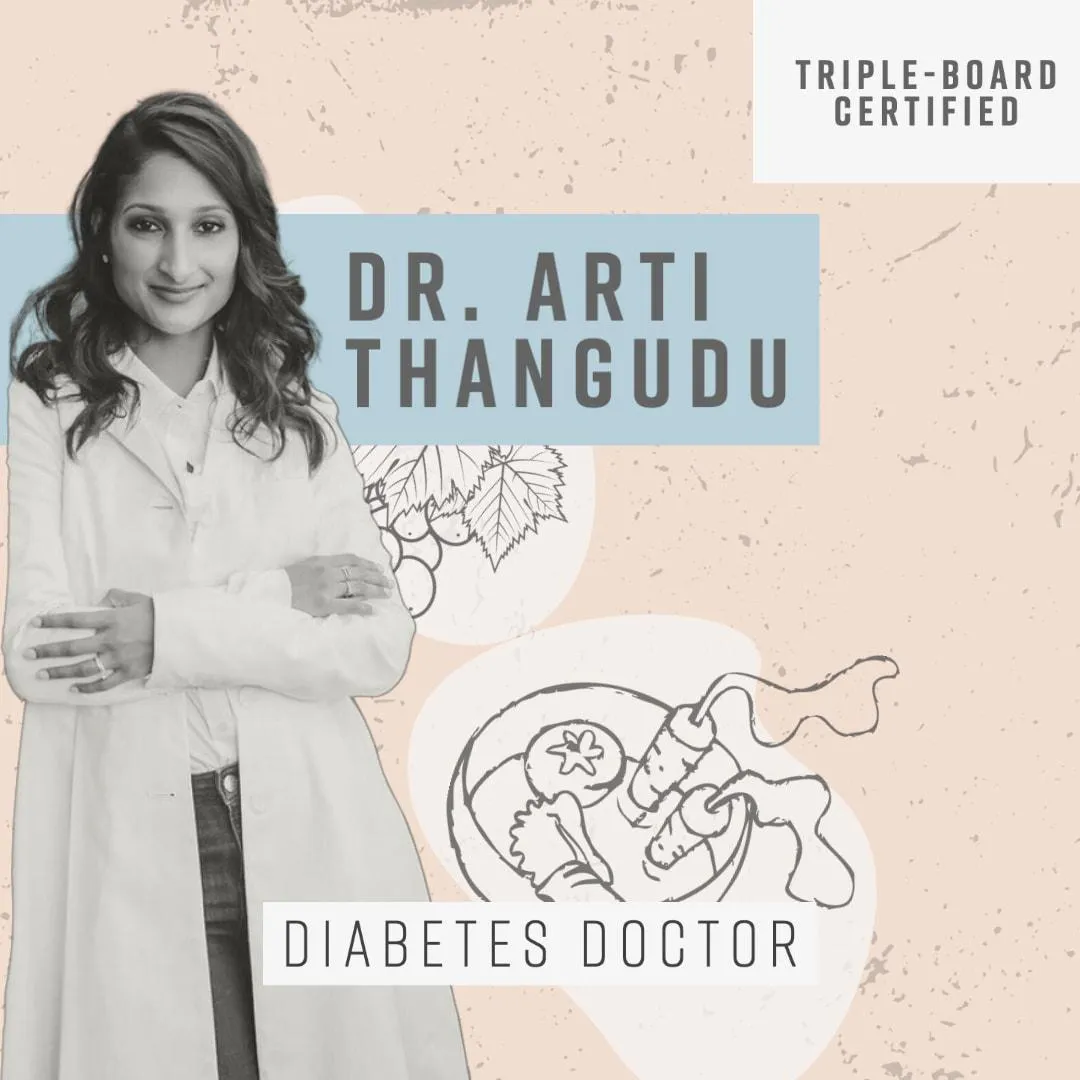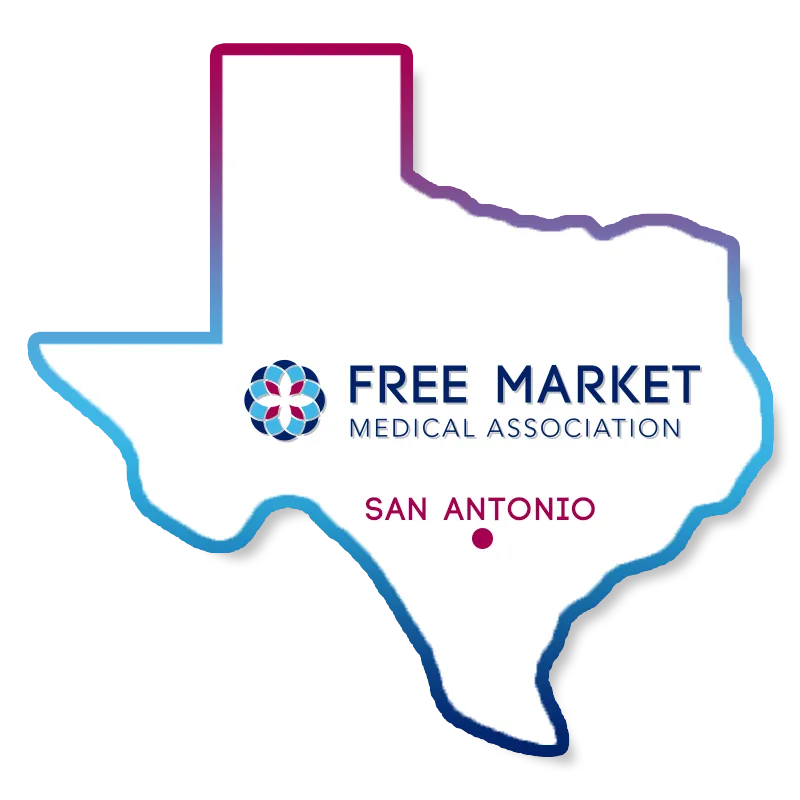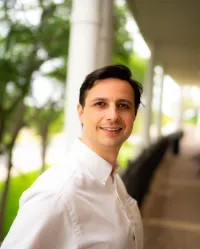Contact Us
sanantonio@fmma.org
Follow Us:
Our Blogs

San Antonio FMMA Member Highlight: Dr. Arti Thangudu of Complete Medicine
FMMA Member Highlight
The purpose of our member highlights is to shine a spotlight on outstanding individuals who form part of a groundbreaking network as members of the San Antonio Free Market Medical Association. For our December issue, we chose to sit down and chat with Triple Board Certified physician and endocrinology, diabetes, and thyroid specialist, Dr. Arti Thangudu of Complete Medicine.
Dr. Thangudu takes an evidence-based approach to care, focusing on the whole patient, not their disease or symptoms. At her membership-based practice, she offers her patients direct access, frequent coaching, and continuous blood glucose monitoring.
Seeing thousands of patients through her practice and rigorous fellowships, Dr. Thangudu is fully aware of the skyrocketing costs of prescription medications. Her practice is designed to work closely with each patient, ensuring they take only the medications they need. She also advocates for health coaching and focuses on healthy, balanced diets to prevent, treat, and reverse chronic disease, so patients can reduce their medications.
Can you explain the direct care model of operation for your practice and clinic?
"With a direct care practice, we're able to do several things that enhance the doctor patient relationship. I don't see as many patients as I used to. It's really hard to have a great relationship with your patients when you're seeing almost 30 individuals a day. In my practice today, I have much fewer patients, they have much longer visits. My initial consultation is 60 minutes, one-on-one, with me and we run like clockwork. With COVID, we've been doing a lot of virtual appointments but my patients always have the option, even before, for virtual visits, phone visits, I call my patients with their labs, I send them their labs in a timely way.
The point is that people need convenience and not everyone can take out a whole day to come and see their endocrinologist. Direct care gives me an opportunity to really know my patients, to engage with them, to have a relationship with them, be their cheerleader, be their support system, and answer questions that they have. There are so many things that we as physicians can do...but there are so many barriers to delivering that level of care for patients — especially for patients with chronic issues like diabetes. Direct care has enabled me to do that."
How did you find out about the option to deliver healthcare using this model?
"I had heard about concierge medicine for a while there were things I both liked and didn't like about it. Then I heard about Atlas MD, a group out of Wichita that have been doing direct care for a long time. I started learning about it, early in my practice. It just made so much sense to me. The non-transparency in pricing to both doctors and patients is harmful. I would have patients come and see me and they have insurance and their co-pay is $150 or $250. Or their insurance won't cover specialists visits at all...so the access to specialists was limited. I realized, they're paying these large sums of money to see me, with insurance — what if we just let go of the insurance and I could help them in other ways — such as with labs, better service, more treatment options?
In a traditional practice, they're paying that much for a 10-minute visit. And that's not very good value. Not to mention the inconveniences of not being able to get through to your doctor, not being able to get an appointment in a timely manner, etc. The average endocrinologist has a 3-month wait-time to get in. So I thought, we can definitely provide much more value if we're not using this system."
Are you operating at capacity?
"I do have the chance to take on new patients but I do have to limit myself to only individuals with the specific issues I treat so that I can help them. I am so pro-physician-entrepreneur because it's a dying theme. So many practices are being bought by hospitals. In some ways, that might be beneficial. I do think you have to have vision and drive. If you want to be employed, that's great too because what I do isn't for everybody. But there is a space for this. I didn't think I was going to start my own practice. I just saw so many holes and gaps in the system and, also, holes and gaps in my life. So I didn't feel that there was an employed position that could fill those gaps.
The day I started publicizing that I'd be leaving my own clinic, everyone wanted to hire me. Cardiologists, family physicians, all these respected and established medical professionals here in San Antonio. And that told me two things. One, I've got something here and, two, there is still room for physician entrepreneurship. You don't just have to work for a hospital system. Of course that depends on your market, where you live, what kind of doctor you are, etc. But I do believe people should not be afraid to think outside of the box."
What brought you into the San Antonio Free Market Medical Association?
"Through my personal experience as well as that of my patients, I've just been, to be honest, totally disgusted by the lack of transparency in medical care. It makes me feel like, what is this system that we're working in? What I mean by lack of transparency is that when you go to your doctor's office, you have no idea how much you're going to pay until they're done. You also didn't have the option to say yes or no to particular procedures. And then, worse, 3 months later, you get another bill...and then another...and another. People don't know that, hey, my specialist co-pays $60 but I actually spent $1,000 or I have $100 co-pay but I spent $2,000 on labs. I have patients who tell me they're spending $2,000 every 3-6 months on bloodwork. It's not that expensive! The only reason we're facing this is because nobody knows what it should cost.
There are people who are taking advantage of this fact. A lot of people are making a lot of money off of patients' and doctors' lack of education. I don't think that's ethical. Doctors-in-training are shielded from cost of care because the thought is that it's unethical to decide to type of care based on cost. However, that would be great if doctors were picking up the bill. And the fact is that not every patient can afford to spend $1,000 on an MRI. There are other options you can use instead as a doctor. Once I started learning more about this, it set me on fire.
If you're in the direct care model, you start to have flexibility. You can negotiate prices for your patients, for example. That's how I got involved with FMMA — the pricing transparency and the improved quality of care you can provide patients when you're in a medical free market is life-changing for both physicians and patients."
Where do you see yourself in five years?
I can't say I have a firm plan for where I want to be in five years but I do want to be a voice for this city to use technology and telemedicine. That's part of what I researched during my fellowship and I utilized it a lot. I have spoken to officials here in the city about telemedicine as a way to access healthcare. The majority of people are dealing with chronic, metabolic diseases, especially in lower socioeconomic neighborhoods. Something we could do is have a hub where we provide telemedicine services, even if there's no setup for high-speed internet yet.
I want to help people recognize what the cost of poor health is. A patient with diabetes spends 2.5 more on healthcare than someone who doesn't face this issue. It is hard because some people feel that investing upfront in my services or in new therapies are higher. But the cost savings down the road is so much greater than the upfront cost. Health is something long-term...and I want to keep reminding people about that."
About the San Antonio Free Market Medical Association
Organized in 2019, Roger Moczygemba, MD and Shankar Poncelet came together with other thought leaders in the community with the goal to lower the cost of healthcare in San Antonio through price transparency, reference-based pricing, and local connection.
The San Antonio FMMA recognizes the three pillars on which the national FMMA was founded by Jay Kempton and Dr. Keith Smith in 2014:
1. Price is not a product.
2. Value is mutually determined and requires transparent pricing and quality.
3. Cash is king, the equality of price is critical.
The FMMA connects buyers and sellers of healthcare, educating and motivating them to work together based upon a mutually beneficial relationship built on the pillars. To learn more, visit https://SanAntonioFMMA.org or contact sanantonio@fmma.org
This member highlight is brought to you by Shankx Web Development and Consulting. For more information, please visit shankx.com.

Follow Us
Follow Us
© Copyright 2024. San Antonio Free Market Medical Association. All rights reserved. Site by SHANKX.
